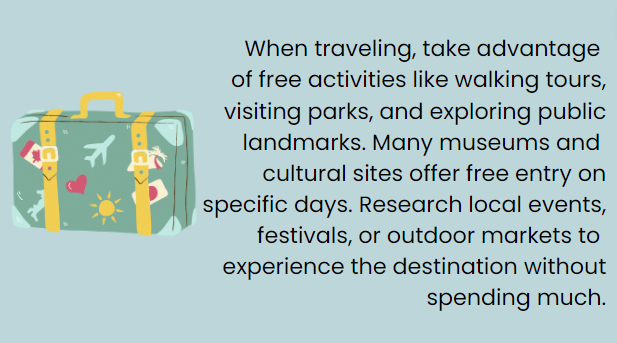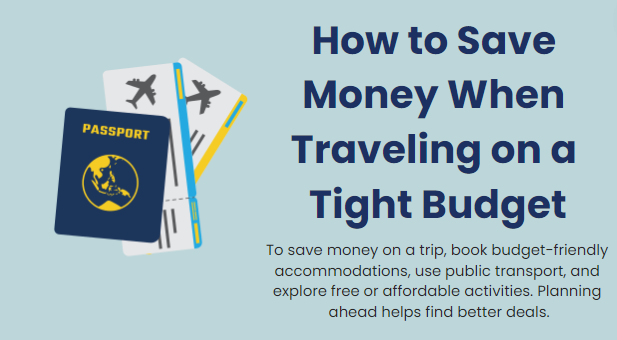Traveling can be an enriching experience, but it often comes with a hefty price tag. Fortunately, with careful planning and smart choices, you can explore the world without draining your bank account. This article provides practical strategies to save money while traveling on a tight budget, featuring tables for quick reference, a conclusion, and frequently asked questions.
1. Set a Clear Budget
Before embarking on your journey, it’s crucial to establish a budget. This will help you track your expenses and avoid overspending.
Budget Breakdown
| Expense Category | Estimated Cost |
|---|---|
| Transportation | $300 |
| Accommodation | $400 |
| Food | $200 |
| Activities | $150 |
| Miscellaneous | $100 |
| Total | $1,250 |
See also>> How to Make Time for Hobbies in a Hectic Schedule
Tips for Budgeting:
- Use a Spreadsheet: Create a detailed spreadsheet to track your expenses.
- Prioritize: Identify which experiences are most important to you and allocate your budget accordingly.
- Emergency Fund: Set aside a small amount for emergencies to avoid financial stress.
2. Choose Budget-Friendly Destinations
Some destinations are inherently more affordable than others. Consider traveling to countries where your currency has more purchasing power. Research locations that offer low-cost living, such as:
- Southeast Asia: Countries like Thailand, Vietnam, and Indonesia are known for their affordability.
- Eastern Europe: Nations like Hungary, Poland, and Romania offer rich culture at lower costs.
- Central America: Countries like Nicaragua and Guatemala provide beautiful landscapes and low prices.
Cost of Living Comparison
- Thailand: Average daily cost of $30
- Hungary: Average daily cost of $40
- Nicaragua: Average daily cost of $25
- Portugal: Average daily cost of $50
3. Travel During Off-Peak Seasons
Traveling during the shoulder season can save you money on flights and accommodations. Prices are generally lower, and attractions are less crowded.
Seasonal Travel Insights
| Season | Best Times to Travel | Benefits |
|---|---|---|
| Peak Season | June to August | High prices, crowds |
| Shoulder Season | April to May, September | Lower prices, fewer tourists |
| Off-Peak Season | November to March | Best deals, quiet locations |
Tips for Off-Peak Travel:
- Research Local Events: Some destinations have festivals or events that can enhance your experience without the peak prices.
- Flexibility: Be open to adjusting your travel dates based on price fluctuations.
4. Find Affordable Transportation
Transportation can be one of the most significant expenses while traveling. Here are some tips to reduce costs:
Transportation Strategies:
- Use Public Transport: Buses and trains are often cheaper than taxis or rental cars. Many cities offer day passes for unlimited travel.
- Book Flights Early: Use fare comparison websites like Skyscanner or Google Flights to find the best deals.
- Be Flexible with Dates: Traveling mid-week can often yield better prices.
Alternative Transportation Options:
- Ridesharing Apps: Services like Uber or Lyft can be cheaper than traditional taxis.
- Biking: Many cities have bike-sharing programs that are affordable and a great way to explore.

See also>> How to Choose the Right Outfit for Any Occasion
5. Opt for Budget Accommodations
Instead of expensive hotels, consider these alternatives:
Accommodation Options:
- Hostels: Great for meeting fellow travelers and often much cheaper.
- Vacation Rentals: Platforms like Airbnb can offer affordable lodging options.
- Couchsurfing: Stay with locals for free, gaining insights into the culture.
Accommodation Cost Comparison
- Hotel: Average cost of $100 per night
- Hostel: Average cost of $20 per night
- Airbnb: Average cost of $50 per night
- Couchsurfing: Free
Tips for Finding Deals:
- Book in Advance: Many accommodations offer discounts for early bookings.
- Use Loyalty Programs: Sign up for hotel loyalty programs for potential discounts and perks.
6. Save on Food Expenses
Dining out can quickly add up. Here are some strategies to save on food:
Food Savings Strategies:
- Cook Your Own Meals: If your accommodation has kitchen facilities, consider preparing your meals.
- Eat Like a Local: Choose local eateries over tourist traps for authentic and affordable meals.
- Grocery Shopping: Purchase snacks and drinks from grocery stores to avoid high prices at tourist sites.
Sample Daily Food Budget
- Breakfast: $5
- Lunch: $10
- Dinner: $15
- Snacks: $5
- Total: $35
Additional Tips:
- Street Food: Often cheaper and a great way to experience local cuisine.
- Lunch Specials: Many restaurants offer discounted lunch menus.
7. Take Advantage of Free Activities
Many cities offer free or low-cost attractions. Research local events, museums with free admission days, or outdoor activities like hiking.
Free Activities List
- Free Walking Tours: Many cities offer guided tours at no cost, relying on tips.
- Museums (Free Days): Check for specific days when museums waive admission fees.
- Parks and Beaches: Enjoy nature without spending a dime.
Tips for Finding Free Activities:
- Visitor Centers: Stop by local visitor centers for brochures on free events and attractions.
- Online Resources: Websites like Meetup or Eventbrite often list free local events.

8. Use Discounts and Passes
Look for city passes that offer discounts on attractions and public transport. Many cities also have student or senior discounts available.
Types of Passes to Consider:
- City Passes: These often include entry to multiple attractions for a reduced price.
- Public Transport Passes: Unlimited travel passes can save you money if you plan to use public transport frequently.
Example of a City Pass
- New York CityPASS: $132, includes Empire State Building, museums.
- San Francisco CityPASS: $94, includes Alcatraz, Exploratorium.
9. Track Your Spending
Keep a close eye on your expenses while traveling. Use budgeting apps like Mint or YNAB to help manage your finances effectively.
Budgeting Apps Comparison
- Mint: Free expense tracking and budgeting tools.
- YNAB: $11.99/month, offers real-time budgeting and goal setting.
- PocketGuard: Free/$4.99, tracks bills and spending limits.
Tips for Effective Tracking:
- Daily Check-Ins: Review your spending daily to stay on track.
- Categorize Expenses: Organize expenses into categories for better visibility.
10. Be Flexible and Open-Minded
Sometimes, the best experiences come from unexpected changes in plans. Be open to adjusting your itinerary based on local recommendations or unforeseen opportunities.
Benefits of Flexibility:
- Spontaneous Adventures: You may discover hidden gems that aren’t in your guidebook.
- Cost Savings: Last-minute deals on accommodations or activities can lead to significant savings.
Tips for Staying Flexible:
- Travel Light: A smaller bag allows for easier changes in plans.
- Stay Informed: Keep an eye on local events or changes in weather that may affect your plans.
See also>> How to Talk So Others Will Listen: Tips for Better Conversations
FAQs
How can I find cheap flights?
Use fare comparison websites like Skyscanner or Google Flights, and set price alerts for your desired routes.
What are some budget-friendly destinations?
Consider Southeast Asia, Eastern Europe, and Central America for affordable travel options.
How can I save on food while traveling?
Cook your own meals, eat at local restaurants, and shop at grocery stores for snacks.
Are hostels safe for solo travelers?
Yes, many hostels have security measures in place and offer a friendly environment for solo travelers.
What should I include in my travel budget?
Include transportation, accommodation, food, activities, and a buffer for unexpected expenses.
Conclusion
Traveling on a tight budget is entirely possible with the right strategies in place. By planning ahead, being flexible, and making smart choices, you can enjoy enriching experiences without overspending. Remember, the goal is to create unforgettable memories while keeping your finances in check.
